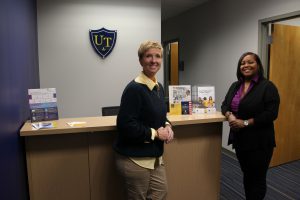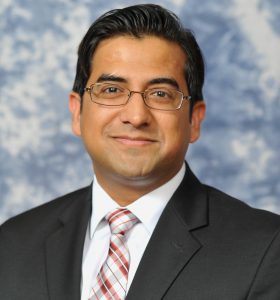Archive for November, 2019
‘Lake Erie Bill of Rights’ Topic of Great Lakes Water Conference Nov. 8
Tuesday, November 5th, 2019Toledo’s Lake Erie Bill of Rights will take center stage during the 19th annual Great Lakes Water Conference at The University of Toledo College of Law.
Approved by voters in February and challenged by a lawsuit in federal court, the new “rights of nature” ordinance that allows citizens to sue on behalf of the lake to address pollution has attracted national and international attention.
The conference, which is sponsored by the College of Law and its Legal Institute of the Great Lakes, will take place from 8:30 a.m. to 3 p.m. Friday, Nov. 8 in the Law Center McQuade Auditorium.
“Three panels of experts will be tackling issues of local, regional, national and international import,” said Ken Kilbert, UToledo professor of law and director of the Legal Institute of the Great Lakes. “Law and policy are key to the solutions.”
The keynote speaker at 8:45 a.m. will be Carrie Sowden, archaeological director of the National Museum of the Great Lakes.
The first panel, which will debate the city of Toledo’s Lake Erie Bill of Rights, starts at 9:15 a.m. Kilbert will serve as moderator with speakers Jason Hill, court administrator for the Ohio Sixth District Court of Appeals, who teaches election law; Terry Lodge, a Toledo attorney who specializes in environmental and energy issues and supports the ordinance; and Louis Tosi, attorney with Shumaker, Loop & Kendrick in Toledo who serves as chair of the firm’s Environmental Practice Group.
The other two panels will explore water quality problems posed by PFAS (per- and polyfluoroalkyl substances) chemicals, a proposed rule affecting the reach of the federal Clean Water Act, Ohio Governor Mike DeWine’s new H2Ohio initiative, and a proposed new diversion of Great Lakes water.
The one-day conference is free and open to the public. Registration is $75 for attorneys seeking 4.5 hours of Ohio Continuing Legal Education credit.
For more information about the conference, visit the College of Law website at utoledo.edu/law/academics/ligl/conferences.
UToledo Pre-Health Advising Center offers enhanced support for students pursuing healthcare careers
Monday, November 4th, 2019The University of Toledo is celebrating the opening of a specialized undergraduate advising center to support students in UToledo’s growing pre-professional and allied health programs.
A ribbon cutting to dedicate the new Pre-Health Advising Center will take place at 9 a.m. on Thursday, Nov. 7, outside University Hall Room 2160. The relocated Nursing Advising Center, located across the hall, also will be recognized.

Pre-Health Advising Center Director Deborah Hendricks, left, and Program Coordinator Shavron Kelley.
The new Pre-Health Advising Center brings together a comprehensive array of services for students interested in pursuing a career in healthcare.
Academic advisers will be available to help students who have declared a pre-med/pre-vet/pre-dental concentration with course selection, provide information about clinical and networking opportunities, and offer guidance on navigating the application process to medical school and other professional healthcare programs.
“We know that jobs in healthcare are growing. As part of our commitment to student success, we want to ensure our students are on-track and well-prepared to enter those career fields,” said Dr. Amy Thompson, vice provost for faculty affairs and professor of public health. “This center provides specialized resources to support and encourage students, as well as help them review their options at UToledo.”
UToledo boasts an extensive catalog of options for undergraduate students pursuing a career in healthcare, including a number of pre-medicine tracks, pre-physical therapy, pre-dental, pre-veterinary and pre-pharmacy.
The Pre-Health Advising Center is open to all undergraduates enrolled in a healthcare program. Staff at the center also can provide guidance to those considering attending UToledo or who are undecided on a major explore the University’s numerous pre-professional and allied health fields.
“We want our students to find the right home for their interests and talents,” Thompson said. “Our advisers can walk students through academic prerequisites and help them evaluate all possible majors that are in the health professions so that they find the best fit.”
The center also has special workshops for pre-medicine, pre-dental and pre-veterinary students, as well as students enrolled in UToledo’s Bacc2MD program and the UToledo/Case Western Reserve University’s School of Dental Medicine program.
UToledo awarded federal grant to train teenagers in cybersecurity
Monday, November 4th, 2019From hackers to cyberbullies, cybercriminals are increasingly targeting technology-hungry teenagers.
To combat the growing problem, the National Science Foundation awarded The University of Toledo College of Engineering a three-year, $267,742 grant to teach local high school students about the risks and threats associated with smartphones, tablets and other technology, as well as provide cybersecurity training to encourage careers in computer science and cybersecurity.

Dr. Ahmad Javaid
“The cybersecurity landscape is changing fast, and due to the ubiquitous information on the internet, the enemies of the state are more dangerous and advanced than ever,” said Dr. Ahmad Javaid, assistant professor in the UToledo Department of Electrical Engineering and Computer Science, director of the Paul A. Hotmer Cybersecurity and Teaming Research Lab, and project leader. “We need to train the future workforce to prepare them for what’s to come and protect the nation.”
The plan calls for a summer camp setting and using interactive, animated visualizations to help students understand cybersecurity threats, defense and prevention mechanisms.
If the project aimed at creating a safer cyber environment is successful locally, the new high school cybersecurity curriculum could be adopted nationwide.
UToledo is collaborating with Purdue University Northwest (PNW) on the research. The NSF awarded PNW about $230,000, bringing the total funding for the project to nearly half a million dollars.
UToledo jumps 43 spots in ‘Best for Vets’ ranking
Friday, November 1st, 2019Surging 43 spots in one year, The University of Toledo has been recognized again as a top school for supporting student veterans.
The Military Times awarded UToledo the Best for Vets 2020 designation, ranking UToledo No. 80 out of 134 four-year institutions. The University was ranked 123 out of 208 in 2019.
“The University of Toledo Military Service Center is honored to help our service men and women succeed, and the Military Times: Best for Vets designation recognizes our steadfast commitment,” said Eric Buetikofer, UToledo director of military and veteran affairs. “We have worked hard over the last year in adding new programming that, we feel, has improved our students’ sense of connection to the University and UToledo community.”
For 10 years, Military Times has conducted an extensive, editorially independent, objective study evaluating the many factors that help make colleges and universities a good fit for service members, military veterans and their families.
“The University has made great strides over the last year to improve our ability to track military-connected students, which has allowed us to communicate more effectively with our student population and work with them as they progress towards graduation and beyond,” Buetikofer said. “This increase in rankings is a reflection of the team effort led by University College, including the Military Service Center staff and student workers.”
The rankings are based on the results of Military Times’ annual survey — a school-by-school assessment of veteran and military student services and rates of academic achievement — as well as a detailed review of public data collected by federal agencies.
Military Times’ annual survey asks colleges and universities to disclose academic outcome and input data; describe many aspects of veteran culture on campus; and document a wide array of services, policies, accommodations and financial incentives offered to students with military ties. Military Times also factors in data from the Veterans Affairs and Department of Defense, as well as three Education Department sources: the Integrated Postsecondary Education Data Center, College Scorecard data and the Cohort Default Rate Database.
See the 2020 Best for Vets list on Military Times’ website at militarytimes.com/education-transition/2019/10/28/best-for-vets-top-colleges-2020.

